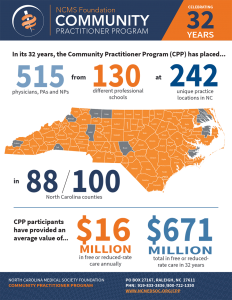CPP 2.0 will combat workforce shortages that limit healthcare in rural and marginalized communities

The North Carolina Medical Society Foundation is building on more than three decades of success to help even more North Carolinians. Thanks to a grant from BlueCross BlueShield of North Carolina Foundation, the Community Practitioner Program is launching CPP 2.0!
The new program will prioritize several areas not previously supported by the CPP Legacy program.
CPP 2.0 will provide:
- Educational loan repayment to behavioral health, maternal and women’s health clinicians.
- Identify opportunities to support retention of clinicians who get educational loan repayment incentives, particularly those receiving NCORH incentive programs.
- It will increase the number of African American/Black, American Indian, Latinx/Hispanic, and LGBTQ+ who apply for the program.
- Develop a workforce pathway into rural and underserved clinical settings by supporting rural preceptors and practice innovation.
CPP 2.0 will also work to alter the current rapidly declining trajectory of NC’s rural healthcare workforce so that it is transformed in a single generation. That includes equitable access, a workforce that mirrors the community it serves, and opportunities for marginalized people who are currently underrepresented.
NCMS CEO Chip Baggett says “NCMS Foundation aims to be a leader in the development of a statewide action plan and a coordinated approach to pathway development, recruitment, and retention. Over the next three years CPP 2.0 will be monumental change for the people of North Carolina.”
“We are excited to invest in solutions to address the increasing challenge faced by those living outside the state’s urban areas to access care,” said John Lumpkin, MD, President of the Blue Cross and Blue Shield of North Carolina Foundation. “For the past three decades the NCMSF has been a leader at expanding the health care workforce where it is most needed, and we value this opportunity to support this next chapter of the Community Practitioner Program as it continues to recognize and meet the evolving needs of those who call North Carolina home.”
